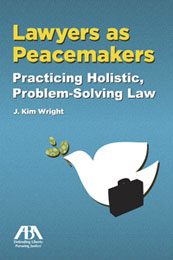Five Ways to Incorporate Holistic Lawyering Into Your Law Practice

J. Kim Wright says it took 10 years to learn the things she needed to know for her new book on holistic lawyering, and a long weekend to write the first draft.
Wright’s new book, published by the American Bar Association, is Lawyers as Peacemakers: Practicing Holistic, Problem-Solving Law.
Wright’s views are informed by an unhappy start in law practice and her experience raising 16 children, 14 of them stepchildren, foster kids and runaways. At work, dissatisfied with her first few child custody cases in Asheville, N.C., she set out to search for an alternative. In 2008, her quest took her on a cross-country trip to tape hundreds of video interviews about a more collaborative approach to law practice. They are available at Wright’s website, Cutting Edge Law.
We asked Wright, who was featured as an ABA Journal Legal Rebel, for five tips on how to incorporate holistic lawyering into law practice. Here’s her advice:
1) Remember, it’s all about context. Wright gives an example learned from her role as a mother, when a child complains about being hit by a playmate. “What I learned to do is to say, ‘And what happened just before he hit you?’ ” Wright says. “It’s about getting a bigger picture.” The same approach can be applied when a client complains about another employee who is treating her badly. The problem could be a workplace disagreement, or it could be a workplace that is allowing sexual harassment. “Clients have this idea about what their real problem is, and they tell us a story, but it might be a completely different problem that needs to be resolved,” she says.
2) Know why you do what you do. Know your purpose and the purpose of law and how those fit together. A lawyer may want to be a peacemaker, a problem solver, a truth teller or a hired gun. “When lawyers are working with clients whose values align with them, I think they’re more effective and happier,” Wright observes.
3) Take care of yourself and others. A stressed-out lawyer can’t serve clients very well, Wright points out. “You have to take care of yourself first so you can take care of other people.”
4) Be respectful of everybody. Too many lawyers consider their clients as cases and files that are part of their to-do list. Instead lawyers should take time to understand their clients and the reasons they sought legal advice.
5) Be curious and keep learning. Many important subjects—such as the dynamics of conflict and the art of listening—are not taught in law school.



